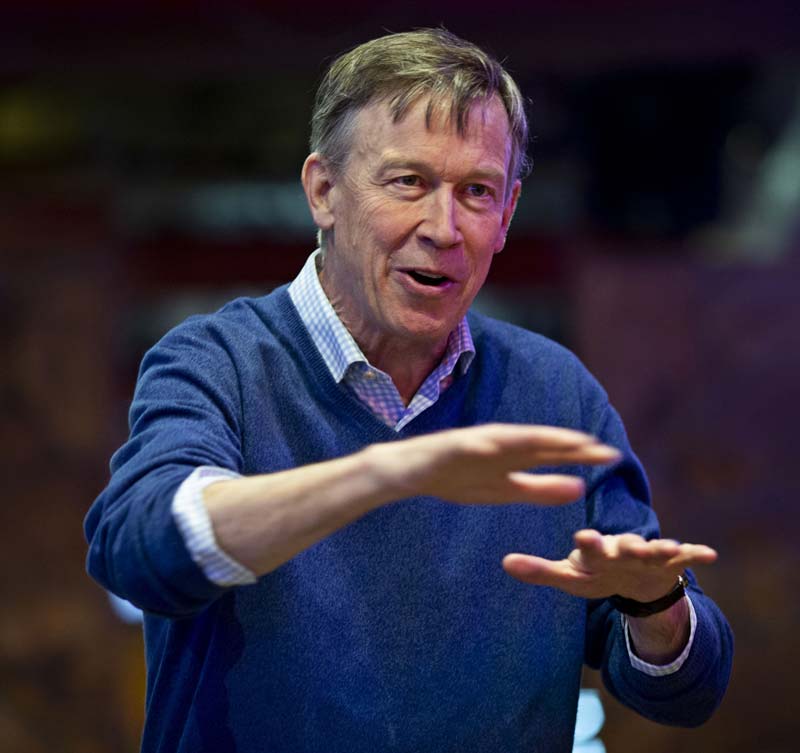 Daniel Acker for Bloomberg
Daniel Acker for Bloomberg
"I'm running for president because we need dreamers in Washington, but we also need to get things done," Hickenlooper, a Democrat, said in a video announcing his candidacy on Monday morning. "I've proven again and again I can bring people together to produce the progressive change Washington has failed to deliver."
Hickenlooper's rollout should be viewed as the opening salvo in a broader battle to pull the center of gravity in the Democratic debate back toward the middle and to emphasize the importance of electability if President Donald Trump is going to be defeated in 2020.
"If everyone yells at Trump, he wins," Hickenlooper said on his most recent trip to Iowa, where he's been testing the waters. "You have to laugh at him and joke along and say, 'Hey, this is what I did.'"
The first two months of this year have been dominated by the left, starting with Elizabeth Warren's New Year's Eve campaign launch and continuing through this past Thursday, when freshman Rep. Alexandria Ocasio-Cortez threatened a roomful of House Democrats with primary challenges if they vote with Republicans.
A procession of more moderate figures has been waiting anxiously in the wings. Consider The Five B's:
1. Former New York mayor Michael Bloomberg is believed to be leaning toward an impending bid for the Democratic nomination, and the billionaire has signaled that he's willing to draw heavily on his personal fortune to make his case. His top advisers have reportedly been interviewing potential hires in early states and looking for office space.
2. It would be very surprising if former vice president Joe Biden decides not to move forward with a third try for the White House. "The timetable remains in question," Dan Balz wrote in Sunday's paper. "Biden has been in no rush to declare his intentions. He resisted recommendations from some advisers to announce early in an effort to shape the race in his favor. He has chosen to wait, preferring to make himself less of a target and to see whether any of the other early entrants would significantly change the landscape. . . . Biden will be betting that this isn't a normal election but rather one that will turn far more on questions about fundamental values than on the specifics of Medicare-for-all or the Green New Deal - or on votes or actions from three or four decades ago."
3. Former congressman Beto O'Rourke, who came surprisingly close to toppling Ted Cruz last year in Texas, is expected to run and may announce later this week. "I'm a capitalist," O'Rourke told reporters recently when asked about climate change. "I don't see how we're able to meet any of the fundamental challenges that we have as a country without in part harnessing the power of the market."
4. Montana Gov. Steve Bullock, who won a second term in 2016 even as Trump carried the state by 21 points, is widely expected to throw his hat in the ring soon. He just wrapped up a term as chairman of the bipartisan National Governors Association.
5. Michael Bennet, one of the most moderate Democrats in the Senate, also continues to explore a potential run. "We don't have to settle for disgraceful politics. We don't have to settle for being as terrible as Donald Trump," Bennet said during a visit to Iowa the weekend before last. "We don't have to settle for Freedom Caucus tactics - those guys are tyrants. We don't have to accept that."
Interestingly, the senator was Hickenlooper's chief of staff during his tenure as mayor of Denver. Hickenlooper encouraged Bennet to take over the city's public schools. Bennet then beat out Hickenlooper to get appointed to the Senate seat that opened in 2009 when Barack Obama appointed Ken Salazar as interior secretary. Both wanted that job. Hickenlooper got elected governor the next year, instead, and just wrapped up his second term. The Denver Post recently highlighted the similarities between them and wondered how they'll differentiate themselves if both get in.
The question now is whether these five white guys, The Five B's, can match the energy level on the left and draw the kinds of crowds that their more progressive competitors have been getting for months. (Sherrod Brown, who has been touring the early states, is one of the more liberal members of the Senate, but he's gotten elected statewide in Ohio several times and has pushed back recently against the lurch to the left.)
Others to watch in the pragmatist lane are former Virginia governor Terry McAuliffe and current New York Gov. Andrew Cuomo. Both are watching carefully to gauge Biden's intentions. WhileCuomo insists he's deferred to Biden, "it's obvious to some who've talked to him that White House dreams still lurk in his head, and that a part of him would like to be running," the Atlantic's Edward-Isaac Dovere reports. "When he looks at the Democrats who are already in the race, he makes a point of noting how many of them he knows, even as he makes clear that he doesn't think any of them measure up."
The 67-year-old Hickenlooper has figured out how to thread the needle in a swing state. After losing his job as a geologist during the 1980s, Hickenlooper opened a successful brewpub and grew the business. He ran for mayor of Denver after leading a citizen's campaign to stop the renaming of Mile High Stadium. After two terms, he was elected governor during a wave year for Republicans in 2010 and (narrowly) reelected in 2014 during another wave.
Hickenlooper worked with a Republican-controlled legislature after he took office. "He signed off on austere budgets that attracted bipartisan support; he allied with Republicans to boost natural gas exploration, and with Democrats to legalize civil unions," Dave Weigel notes. "In 2012, when a man shot and killed 12 people in a suburban Denver movie theater, Hickenlooper began to advocate a ban on extended magazines. . . . In 2017, he and Ohio Gov. John Kasich, a Republican, led a bipartisan group of governors to oppose Republican efforts to repeal the Affordable Care Act. . . . In 2018, Hickenlooper threatened to call a special legislative session to undo an anti-fracking ballot measure, if voters passed it; he backed down only after the measure failed."
In materials sent to reporters, Hickenlooper's campaign team highlights his efforts to woo GOP support for expanding Medicaid in Colorado and his success as mayor in partnering with Republicans in the suburbs to expand mass transit. He was initially opposed to legalizing marijuana, fearful that it would lead to more kids using drugs, but he's evolved and worked to make the recreational sale of pot as safe as possible. He supported the death penalty when he ran in 2010 but changed his mind before running for a second term. The issue made his reelection race much tighter in 2014 than it would have been otherwise.
The former mayor and governor will hold a "send-off" rally on Thursday night in the Greek Amphitheater at Denver's Civic Center Park before flying to Iowa for events on Friday and Saturday. Then he will head to South by Southwest in Austin on Sunday.
The narrative continues to cement that the Democratic Party is moving into territory that could make it hard for the eventual nominee to beat Trump. Consider these three stories that posted over the weekend:
1. Pennsylvania Democrats fear the party's leftward drift could cost them victories next year, Trip Gabriel reports in the New York Times: "It is probably no coincidence that most of the Pennsylvania Democrats who won Republican-held congressional seats last year were moderates who had defeated progressives in primary contests. The one progressive who made it to the general election in a competitive district, Scott Wallace, lost to the Republican, Brian Fitzpatrick, in Bucks County, which Hillary Clinton carried. Leading Democratic and Republican strategists in Pennsylvania said the most likely nominees to carry the state, at this early stage, appeared to be [Biden], a native of Scranton, and Senator Amy Klobuchar of Minnesota, both of whose centrist policies fit comfortably with the state's voters."
2. "When did everyone become a socialist?" That's the question posed on the cover of next week's New York magazine: "Coolheaded Obaman technocracy is out; strident left-wing moral clarity is in. And while this atmospheric shift is felt most acutely among the left-literary crowd, it's also bled into the general discourse, such that Teen Vogue is constantly flacking against capitalism and one of the most devastating insults in certain corners of the internet is to call someone a neoliberal."
3. "John Anzalone, an Alabama-based Democratic pollster, said the perception that the party's primary voters are enthusiastically liberal is not based on data," The Washington Post reported Saturday. "There is, without a doubt, a myth that Alexandria Ocasio-Cortez somehow represents the narrative of Democratic primary voters in the country," Anzalone said. "Almost half of them identify themselves as moderates or conservative."
Sign up for the daily JWR update. It's free. Just click here.
(COMMENT, BELOW)


 Contact The Editor
Contact The Editor
 Articles By This Author
Articles By This Author